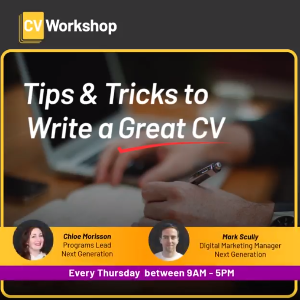A reflection on feedback and 6 weeks of CV workshops
When the COVID-19 crisis hit and people started losing their jobs right, left and centre, we at Next Generation started wondering what we could do for the community. Next Generation is a recruitment company, and in the early days of the crisis, (almost) all recruitment had stopped, so directly helping people get a job became harder, and for myself as the in-house recruiter, totally impossible.
So what could I do? I still have a job, albeit focused on HR, L&D and Data Protection, but I have a lot of experience in Recruitment (I’ll be hitting my 10th year in Recruitment in July), so how could I use that to help people who were less fortunate in the job department? With my colleague, Mark Scully brainstormed about what Next Generation could do to give back to the community, and the CV idea came up very rapidly. I guess after sitting beside me for a year and listening to me give out about CVs written in font size 8, CVs that starry night header or more commonly, CVs with an Objective/Profile stating they were looking for an HR role or an In-house recruiter role even though they applied for an agency recruiter role, we knew there was a need to help people with their CVs.
 So we launched the CV workshop, and a couple of days afterwards, we had to quickly close the calendar as we were booked-up until the end of May, and regardless of how much we want to help people, we also have a job to do and the CV workshop is pure pro-bono work, there’s nothing in it for us.
So we launched the CV workshop, and a couple of days afterwards, we had to quickly close the calendar as we were booked-up until the end of May, and regardless of how much we want to help people, we also have a job to do and the CV workshop is pure pro-bono work, there’s nothing in it for us.
What did I learn from 6 weeks of CV workshops?
- A lot of people don’t have the basics covered on their CV.
- A lot of people expect us to rephrase their entire CV for them.
- A lot of people take the piss and don’t show up or show up late.
- A lot of people don’t really want to hear the feedback we give them.
- A lot of people will send back a very similar CV for review after the workshop session.
Let’s talk about feedback.
Giving feedback, positive or negative/constructive, is always hard work. People will remember the “bad” feedback, way more than the “good” one. Also, a lot of the times, you get more “bad” feedback than good “feedback” in terms of quantity. When your manager is happy with your work, you usually get something fairly generic, such as “great work on that project” or “you’re doing a good job”. However, when – to overly simplify – your manager is not so happy with your work or performance, the feedback that you get is usually a lot more detailed. Overall, the quantity and detail of the feedback you receive are what makes you remember the negative feedback more than the positive one.
My esteemed former colleague Marion Tilly wrote a blog post recently about how to receive negative feedback (you can read it here, it’s really good) and the advice that she gave in that piece is an exact match to what I’ve noticed during the CV workshops, but the foll
owing 3 seemed the most important and valuable from my experience with the CV workshops:
- Change your mindset
- Be proactive and work on your areas of development
- Take notes of what was said to you
Change your mindset:
One would think that if you register for an individual CV workshop, you would be prepared to be told that a lot of things on your CV will need to be changed.
During these workshops, we review the CV that the person has sent us point by point and we give them feedback based on what we read and what they told us about the jobs they are applying for.This couldn’t be further from the truth. Even though we promised people honest feedback and an insight into the brains of a recruiter and a hiring manager (Mark and I), we see people getting offended and/or upset when we point out things in their CV that they need to change.
Often, the feedback we give is: “Based on what I’m reading on your CV, your profile sounds like a marketing one, I wouldn’t progress your application for an inside sales role.” (Insert appropriate jobs)
Is it harsh or is it just the honest truth?
It may sound harsh out of context, but if you told us you’re applying for inside sales jobs, we’ll be looking for the relevant elements on your CV. This is not a reflection on you as a person; this is what I read on your CV, this is what I understand and interpret from what I’m reading, so this is my conclusion as a recruiter.
I see a lot of people getting upset or annoyed when my interpretation of what is written on their CV is not what they meant. Unfortunately, when you apply for a job, you won’t be there to transcribe to the recruiter the meaning of what you wrote, so it’s really important to get that meaning across through what you’re writing on your CV.
Honestly, I really don’t enjoy telling you that I wouldn’t progress your application for your dream job based on the CV I’m reading. “Chloé Morisson, crushing hopes and dreams since 2010” – the side of recruitment no-one tells you about.
So if we take the CV workshop, we try to turn:
“This CV is unreadable and looks goddam awful.” - Tough, I know, but when it's your 6th workshop of the day, font size 8 on a half-page long paragraph is just not cutting it.
into
“You should use only one font, and probably not Comic Sans. Stick to consistent font sizes and colours. On average, a recruiter reads between 50 and 200 CVs in a day, so making it readable and making sure your achievements and important information are easily findable, increase your chances of getting called.”
And the more controversial “I appreciate that you’re trying to create subdivisions by using bold and the purple, but it’s a big and dense paragraph, so instead of reading the important information, my eyes keep going back to the useless titles (tools used, methodologies used) because they are in bold and purple”.
In the last 6 weeks, we’ve given that feedback countless times, and it’s actually valuable insight to know how people read your CV… however, you have to be in the mindset to receive that feedback. The people who got the most value from us were the ones who were happy for us to be bluntly honest.
Be proactive and work on your areas of development.
I appreciate CVs are really difficult to write, but if you find it hard for yourself to write about your own experience, imagine what it’s like for us.
We see a lot of CVs that read like a description of the job in the company; and that is totally pointless: if your CV could apply to anyone in your team, it has no value when it comes to selling you. During the CV workshops, we do our best to give you an example of how to rephrase what you’ve written in a way that would showcase your value or your achievements more.
But…and that’s a big but, no-one knows your achievements better than yourself (yes, that includes your manager), so you can’t expect us, or anyone for that matters to rephrase your CV for you.
Quite often we’re on the receiving end of “Right, how would you say it, then?”
Mhhhh… Well…
How about, now that I’ve flagged an area of development, you’d be proactive about it and actually try to rephrase your experience?
It works for every type of feedback you receive. If your manager is giving you constructive feedback on something, they expect you to come up with a solution to improve or rectify the situation. We’re all adults in the work world, so spoon-feeding is just not something that we should expect.
Take notes of what was said to you
That brings us back to the mindset. Are you prepared to receive feedback or are you waiting for someone else to tell you what to do and how to do it?Last but not least, if anyone went to the trouble of giving you detailed feedback, take notes. I get it, the feedback may take you by surprise and you need some time to compose yourself and really take in what’s being said to you. Ask to adjourn the meeting if you’re feeling too upset to remember what’s being said.

At the beginning of the CV workshops, we offered people to send us their updated CV and to provide more feedback.
95% of the CVs we received were better in terms in the formatting, typos, etc. however the actual content was in its vast majority exactly the same and we really (I mean, really) didn’t have the time to send more individual feedback at that scale.
So what now?
Well, based on these 3 issues and the fact that the CV Workshop is free and pro-bono, we’re changing the format. It will still be 100% free and pro-bono but the burden of proactivity won’t be on us anymore and you’ll be able to refer to the advice later on if you didn’t take notes. So watch this space!

